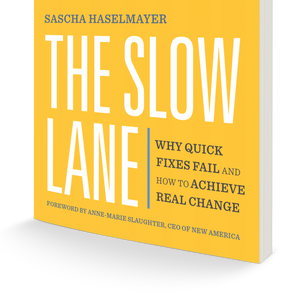“If it takes three generations to make progress, there must be something wrong with the community!”
This was how a speaker, a prominent placemaking professional, at a conference last week responded to The Slow Lane. Specifically, she was responding to the Slow Lane story of Denisa Livingston and her movement of families restoring justice in food and community health in the Navajo Nation. It is also a reminder of why we cannot take it for granted that people around us appreciate what real change means.

In the same panel, a well-known German climate activist had this to say:
“I don’t have the luxury of time for building trust, talking to everyone. Unlike the stories you presented, I don’t have the luxury of time in fighting climate change.”
These two critical perspectives on the Slow Lane are a reminder of how quick fixes come about. We could call it the paradox of urgency. In the face of crisis, activists focus on the outcome they want to solve their problem. For a placemaker, this might be a vibrant square used by a community. For a climate activist, it might be more stringent CO2 emission laws. From there, the means justify the ends: it is not so much a matter who takes part, for as long as enough people participate to win the vote or fill the square. Inevitably, this leaves people behind. Mostly those, who are already excluded from existing services and systems. Both speakers showed no interest in engaging with disadvantaged groups for as long as they weren’t needed to achieve their goal.
Face it: Quick-fixes That Exclude People Won't Work
One Slow Lane response to these activists is this: Every time you exclude those already most excluded from participation today, you are creating quick-fixes that won’t work. Not engaging people with disabilities, for example, in environmental activism has led to solutions that exclude them: In Germany, flood emergency plans overlooked people with disabilities in the Ahrtal valley. In 2021, a flood, caused by intensive rain in the area, killed 12 people with disabilities in a supported living facility. It also gave us electric vehicle charging stations in cities around the world, the product of lobbying by activists and some of the world’s smartest engineering talent for over a decade, that cannot be used by wheelchair users. It was only in 2022, that the President of the UK car owner's association AA called for a fix to make electric vehicle charging stations accessible. That is a full 108 years after GM installed the first “Electrant” charging stations. In short: Quick fix solutions, laws, and regulations will be just another band-aid that deepens what divides us. And wasn’t it this lack of holistic thinking that got people into activism in the first place? Decisions made by people who didn’t take the environment into account?


The same holds true about how we create places and spaces for everyone. What if, like Denisa and her community, you have suffered generations of discrimination alienating people from their culture, habits, rights, and land stewardship? Yes, something is very wrong when you have to accept that restoring your human rights, lands, and culture will take generations. But the wrong isn’t to be found in a community that would love nothing more than immediate change. The wrong is the long legacy of discrimination and persecution that used every available system to stifle the prospects of people, and created divisions within. Accepting that this journey will take generations is a sign of the wisdom of a community that has a deep tradition of stewardship on behalf of future generations: first of land and nature, and now, of the journey to emancipation.
The Fast Lane Of Exceptionalism
To me, this encounter highlighted another, important feature of the Fast Lane mindset to change: the self-belief to have an exceptional calling, that somehow, the Slow Lane applies to everyone else. “My cause”, the climate activist said, “is different.” In other words: the rules don’t apply to those people, who are dealing with an exceptional crisis. Two worlds collide here and reveal, why decades of environmental activism might have yielded so few results: At any point the facts, the science, and the situation were incredibly urgent. There is no doubt about it. But sacrificing inclusion, care and participation of those we don’t need right now to win our battles, inevitably sets you up for failure later on. After all, it was only last week, that for the first time a politician of the extremist right-wing AfD party in Germany was elected district administrator–with a strongly anti-environmentalist (and immigration) agenda. Nationally, the party now polls on par with other major parties at about 18%.
Hold The Urgency, Trust What Works
What the Slow Lane teaches us is that practicing care and inclusion in pursuing even the most urgent agenda, helps build alliances and human experiences that lead to truly transformative change down the line. In my book, I wrote that going down the Slow Lane can feel like practicing the trust fall: to some extent, you have to believe that it will work. And there is a compelling case for why it works:
First, it has produced the kind of change that we want to see without leaving communities divided, or people resorting to autocratic means.
Second, it strengthens our democracy, bringing more voices and perspectives to our discourse and decisions. Instead of polarizing further, people come equipped with new answers and solutions and an openness to find new ways. They also bring attention to the root causes and inequities of our broken systems.
Third, it is joyful, engaging people by listening, and sharing the agency with them. It cannot simply be transactional, but has to be fully immersive, seeing eye to eye. For me, it recalls memories both as a child and as a parent when I am lost in play. It is a way of embracing our relationships, not managing them.
And lastly, the Slow Lane produces infectious answers. That's partly because they are open and flexible, welcoming and inclusive to others. After all, replacing a tax on healthy food in the Navajo Nation with a tax on junk food is a compelling invitation to everyone, except a handful of lobbyists for big food and soda. And this kind of invitation creeps up on people, as more and more people around them see the beauty in it.
Faced By The Urgency Paradox, Take The Slow Lane
I hope that more and more activists facing the urgency paradox and torn by their urgency to save and improve the world, will learn from the Slow Lane. I fear that otherwise, we will burn through endless energy, and time, wasted on pursuing shortcuts that will reveal themselves as speed traps. Getting out of the hamster wheel of quick fixes is hard, but promises a much bigger prize.
After all, travelling at the speed of trust means that we can all arrive in the right place, together.
The Slow Lane is now available as an audiobook on Audible, narrated beautifully by an incredible storyteller.



